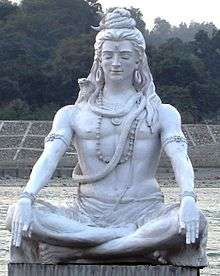Shiva Stuti
Shiva Stuti (Sanskrit:शिवस्तुति; IAST:Śivastutī), is one of the most famous Stutis (poems) composed by Sri Narayana Panditacharya in praise of Lord Shiva.[1] Stuti means eulogy, singing praise, panegyric and to praise the virtues, deeds and nature of God by realising them in our hearts.[2] In this stuti Narayana Panditacharya eulogised the power, beauty, virtues, qualities, and also the five forms of Lord Shiva. The Shiva Stuti consists of 13 verses and is recited daily or on special festivals like Maha Shivaratri by Hindus. Once it so happened that when Sri Narayana Panditacharya went to Rameshwaram Temple, the doors were closed. He prayed Lord Shiva with "Shiva Stuti". The temple doors opened automatically and he had the darshan of Lord Shiva.[1][3][4][5]
| Shiva Stuti | |
|---|---|
| Information | |
| Religion | Hinduism |
| Author | Narayana Panditacharya |
| Language | Sanskrit |
| Period | 13th century |
| Verses | 13 |

| Part of a series on |
| Hindu scriptures and texts |
|---|
 |
| Related Hindu texts |
|
Timeline |
Commentaries
- Chalari Narasimhacharya wrote a commentary on Shiva Stuti.[6]
References
- Sharma 2000, p. 221.
- Arapura 2012, p. 37.
- Glasenapp 1992, p. 228.
- Sivaramamurti 1976, p. 84.
- Emeneau 1967, p. 89.
- Sharma 2000, p. 500.
Bibliography
- Sharma, B. N. Krishnamurti (2000). A History of the Dvaita School of Vedānta and Its Literature, Vol 1. 3rd Edition. Motilal Banarsidass (2008 Reprint). ISBN 978-8120815759.
- Glasenapp, Helmuth Von (1992). Madhva's Philosophy of the Viṣṇu Faith. Dvaita Vedanta Studies and Research Foundation.
- Sivaramamurti, C. (1976), Śatarudrīya: Vibhūti of Śiva's Iconography, Abhinav Publications
- Emeneau, Murray Barnson (1967), American Oriental Series, Volume 7, American oriental society
- Arapura, J.G. (2012), Gnosis and the Question of Thought in Vedānta: Dialogue with the Foundations, Springer, ISBN 978-9400943391